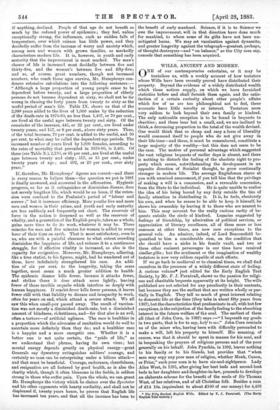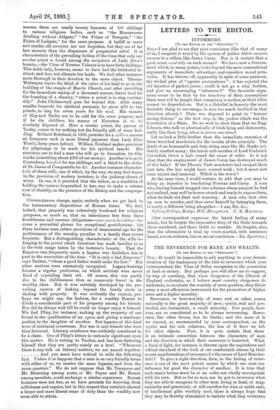WILLS, ANCIENT AND MODERN.
ONE of our contemporaries entertains, or it may be tantalises us, with a weekly account of how testators whose Wills have been recently proved have distributed their property. Beyond the evidence of a widely distributed wealth which these notices supply, on which we have furnished statistics before and shall furnish them again, and the satis- faction of a certain curiosity about other people's affairs which few of us are too philosophical not to feel, these accounts have little novelty or interest. Testators seem very seldom to look beyond their own family or kindred. The only noticeable exception is to be found in bequests to charities ; and these bear but a small, and, we are inclined to think, a decreasing proportion to the total of the wealth devised. One would think that so cheap and easy a form of liberality would commend itself to people who do not give away in their life-time—and these, it must be remembered, constitute a large majority of the wealthy—but this does not seem to be the case. The motive of personal advantage which suggested the vast religious bequests of earlier days is absent, and there is nothing to disturb the feeling of the absolute right to pro- perty which seems, notwithstanding the development in an opposite direction of Socialist thought, to grow continually stronger in modern life. The average Englishman stares at you with unmixed amazement, if you tell him that the privilege of making a will is a concession, and a revocable concession, from the State to the individual. He is quite unable to realise the idea of his being bound by any duty outside the ties of family attention in distributing it. It is, he feels, absolutely his own, and when he ceases to be able to keep it himself, he shows his ownership by leaving it to those who are nearest to him. This may account for the really curious rarity of be- quests outside the circle of kindred. Legacies suggested by feelings of friendship, by admiration of political services, or appreciation of literary excellence, all of them more or less common at other times, are now rare exceptions to the general rule. An admirer, indeed, of Lord Beaconsfield be- queathed to him a considerable inm, on the condition that she should have a niche in his family vault, and two or three other eminent personages in our time have received. similar gifts ; but the sentiment or the imagination of wealthy testators is now very seldom capable of such efforts.
If we go back to medimval or to classical times, we shall find ourselves in the presence of a widely different state of feeling. A curious volume* just edited for the Early English Text Society, by Mr. F. J. Furnivall, shows us the passion for religi- ous and charitable bequests apparently at its height. The wills published are not selected for any peculiarity in their contents, but because they are the earliest that are written wholly or par- tially in English. They tell us much of great interest relating to domestic life at the time (they take in about fifty years from 1387), but the characteristics that predominate in all, with but few exceptions, is the subjection of the familyfeeling to the absorbing interest in the future welfare of the sonl. The earliest of them all (that of John Corn, in 1387) says :—" I bequeath my goods in two parts, that is for to say, half tome." John Corn reminds us of the miser who, having been with difficulty persuaded to make a will, left his property to himself. His meaning, of course, was that it should be spent in masses for his soul, and in bespeaking the prayers of religious persons and of the poor generally on his behalf. John Pynchin, in 1392, leaves nothing to his family or to his friends, but provides that "when men may espy any poor man of religion, whether Monk, Canon, or Friar," such poor man is to have six-and-eightpence. Lady Alice West, in 1395, after giving her beet beds and second-best beds to her daughters and daughter-in-law, proceeds to develope an elaborate scheme for the benefit of the souls of Sir Thomas West, of her relatives, and of all Christian folk. Besides a sum of £14 10s. (equivalent to about 2160 of our money) for 4,400 • The Fifty Earliest English Wills. Edited by F. I. Furnivell. (The Early English Text Society.)
masses, there are nearly twenty bequests of 100 shillings to various religions bodies, such as "the Menonresses dwelling without Aldgate," "the Friars of Newgate," "the Friars of Ludgate," for the same purpose. A bailiff or reeve and sundry old servants are not forgotten, but they are of far less account than the dispensers of purgatorial relief. It is characteristic of the prevailing feeling of the time that only one secular priest is found among the recipients of Lady Alice's bounty,—the Vicar of Newton Valance is to have forty shillings. 'This noble lady, however, seems to have had the territorial in- stinct, and does not alienate her lands. We find other testators more thorough in their devotion to the same object. Thomas Walwayne leaves the third of the value of his land to go to the building of the steeple of Marcie Church, and after providing for the immediate saying of a thousand masses, leaves land for the founding of a chantry, "where a priest is to sing continu- ally." John Chelmeswyk goes far beyond this. After many smaller bequests for spiritual purposes, he gives £70 to two priests, to sing for seven years for his soul. His manors of Hay and Tasley are to be sold for the same purpose, and if he die childless, his manor of Havertou is to be similarly disposed of. Here a secular priest, the parson of Tasley, comes in for nothing but the friendly gift of some bed- ding. Richard Bokeland, in 1436, provides for a million, masses at fonrpence each (a more liberal payment than Lady Alice West's, forty years before). William Newland makes provision for pilgrimage to be made for his spiritual benefit. His executors are to find a man who will go to Jerusalem for fifty marks (something about £300 of our money). Another is to go to Canterbury barefoot for ten shillings, and a third to the shrine of St. James of Compostella for £5. Another common character- istic of these wills, one of which, by the way, we may find traces in the provision of modern testators, is the jealousy shown of wives. In one, it is provided that the widow, as a condition of holding the manors bequeathed to her, was to make a solemn wow of chastity, in the presence of the Bishop and the congrega- tion.
Circumstances change, again, entirely when we get back- to the testamentary dispositions of Roman times. We find,
indeed, that property was extensively burdened for religious purposes, so much so, that an inheritance free from these troublesome and onerous obligations—sine souls hereditas—be- .eame a proverbial phrase for exceptional good-fortune ; but these burdens were rather provisions of immemorial age for the performance of the worship peculiar to a family than recent
-bequests. But a distinguishing characteristic of the wills be- longing to the period which literature has made familiar to us is the wide range taken by the testator's bounty. That the Emperor was frequently made a legatee was doubtless due in part to the necessities of the time. "It is only a bad Emperor," says Tacitns, "whom a good father would make his heir." But -other motives were extensively recognised. Legacy-hunting
• became a regular profession, on which satirists were never tired of expending their wit. Of course, this was partly due to the childlessness then so commonly found in the wealthy. class. But it was certainly developed by the pre- -vailing custom of looking beyond the family circle in -dealing with property. It was evidently the custom, per- haps we might say, the fashion, for a wealthy Roman to -divide a considerable part of his property among his friends. Nor did he always wait till he could no longer enjoy it himself. We find Pliny, for instance, making up the property of one +friend to the qualification of an equee, and giving a marriage- portion to the daughter of another. But legacies of this kind were of continual occurrence. Nor was it only friends who were thus favoured. Literary excellence was evidently considered to be a claim. One of Pliny's letters is curiously significant upon this matter. He is writing to Tacitns, and has been flattering himself that they are pretty nearly on a level. "Whenever there is any talk on literary matters, we are named together.
And you must have noticed in wills the following fact. Unless it so happens that a man is on very friendly terms with either of us, we receive the same legacies, and from the same quarters." We do not suppose that Mr. Tennyson and Mr. Browning among poets, or Mr. Payne and Mr. Besant among novelists, could exchange a similar experience. Roman testators were not free, as we have grounds for knowing, from selfishness and caprice, but in this respect they certainly showed a larger and more liberal sense of duty than the wealthy now seem able to attain.



































 Previous page
Previous page